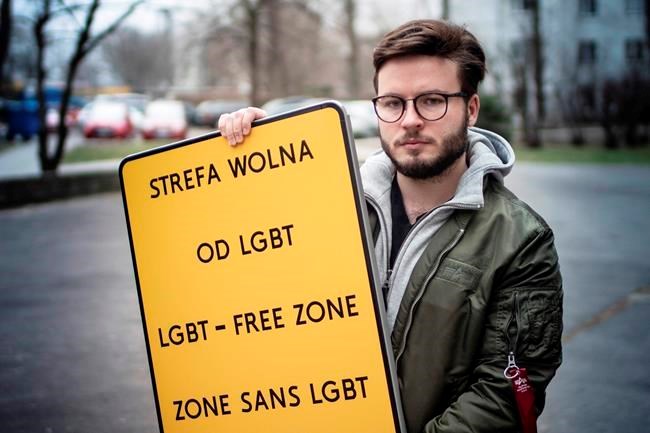BRUSSELS — The European Parliament has overwhelming adopted a resolution declaring the entire 27-member European Union a “freedom zone” for LGBT people, an effort to push back on rising homophobia in Poland and elsewhere.
The parliament announced Thursday that there were 492 ballots in
The resolution came largely in reaction to developments over the past two years in Poland, where many local communities have adopted largely symbolic resolutions declaring themselves free of what conservative authorities have been calling “LGBT ideology.”
These towns say they are seeking to protect traditional families based on unions of men and women, but LGBT rights activists say the designations are discriminatory and make gays and lesbians feel unwelcome. The areas have come to be colloquially known as “LGBT-free zones.”
Polish President Andrzej Duda won re-election last summer after a campaign in which he spoke out often against the LGBT rights movement, depicting it as a threat to families. In once instance, he described it as an “ideology” more dangerous than communism.
The resolution is the work of a cross-party group in the European Parliament, the LGBTI Intergroup. The text refers to “growing hate speech by public authorities, elected officials — including by the current President" of Poland.
But it also mentions that discrimination remains a problem across the EU.
The Polish government has denounced the resolution. It argues that Poland, as a sovereign nation and a society more conservative than many Western European countries, has the right to defend its traditional family values based on a long attachment to Roman Catholicism. It accuses the EU lawmakers of overstepping their jurisdiction.
The government also has argued that the rates of hate crimes are lower in Poland than in many countries in Western Europe.
However, LGBT rights activists say this is impossible to measure. Kuba Gawron, who has been documenting local anti-LGBT resolutions with the group Atlas of Hate, said that there is no mention in the Polish penal code specifically about homophobic crimes, so police do not keep statistics of such crimes.
“We don’t know the full number of such cases,” he said.
The European Parliament's resolution said the fundamental rights of LGBT people have also been “severely hindered” recently in Hungary, due to a de facto ban on legal gender recognition for transgender and intersex people. It also notes that only two member states — Malta and Germany — have banned “conversion therapy,” a controversial and potentially harmful attempt to change a person’s sexual orientation.
__
Corrects spelling of last name of activist to Gawron.
The Associated Press


